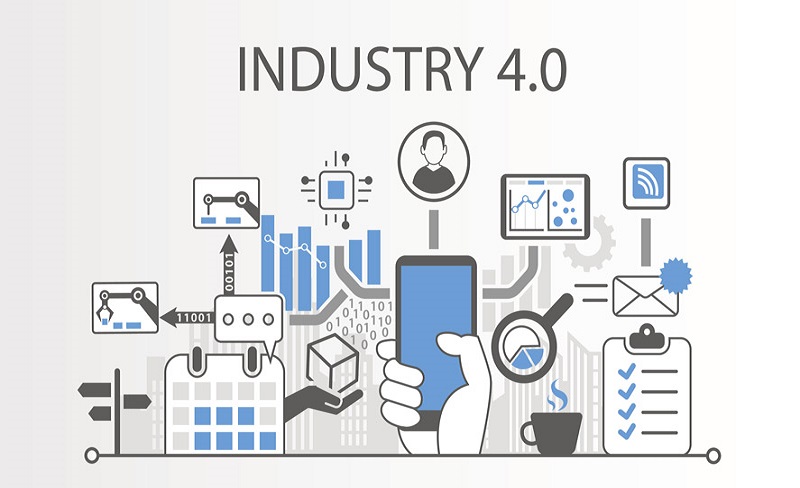
Industrial automation and the Fourth Industrial Revolution
- by PLC
- Jun 19, 2023
Industrial automation and the Fourth Industrial Revolution, also known as Industry 4.0, have transformed the manufacturing landscape, paving the way for a new era of efficiency, productivity, and innovation. With advancements in technology and the integration of digital systems, Industry 4.0 is revolutionizing traditional manufacturing processes, making them more intelligent, interconnected, and automated. In this blog, we will explore the concept of industrial automation and delve into how Industry 4.0 is reshaping the future of manufacturing while emphasizing the importance of original content and avoiding plagiarism.
Understanding Industrial Automation:
Industrial automation refers to the use of technology and control systems to operate machinery and processes with minimal human intervention. By automating repetitive tasks and streamlining production, companies can enhance productivity, reduce costs, improve quality, and ensure worker safety. Industrial automation encompasses various technologies, such as robotics, artificial intelligence (AI), machine learning, Internet of Things (IoT), and data analytics.
The Evolution of Industry 4.0:
Industry 4.0 builds upon the advancements of the previous industrial revolutions and focuses on the fusion of physical and digital systems. This new era is characterized by the integration of cyber-physical systems, intelligent automation, and real-time data analysis. Key technologies driving Industry 4.0 include IoT devices, cloud computing, big data analytics, augmented reality (AR), and additive manufacturing (3D printing).
Benefits of Industry 4.0:
Industry 4.0 brings numerous benefits to manufacturing processes and businesses as a whole:
a. Increased Efficiency: With automated and interconnected systems, manufacturers can optimize operations, minimize downtime, and improve overall equipment effectiveness (OEE).
b. Enhanced Productivity: Smart factories leverage real-time data and AI algorithms to optimize production schedules, predict maintenance needs, and enable proactive decision-making, leading to increased productivity.
c. Improved Quality Control: Through advanced sensors and data analytics, manufacturers can monitor and control processes more effectively, resulting in higher product quality and fewer defects.
d. Cost Reduction: Automation reduces labor costs, minimizes material waste, and enables predictive maintenance, all of which contribute to significant cost savings.
e. Workplace Safety: By automating hazardous and repetitive tasks, Industry 4.0 improves worker safety and reduces the risk of accidents.
Transformative Technologies in Industry 4.0:
a. Robotics and Cobots: Advanced robots work alongside human operators, facilitating collaboration and improving productivity. Collaborative robots, or cobots, are designed to interact safely with humans, enabling efficient human-machine cooperation.
b. Internet of Things (IoT): Connected sensors, devices, and machines enable real-time monitoring, data collection, and analysis, leading to better decision-making, predictive maintenance, and optimized processes.
c. Big Data and Analytics: The vast amount of data generated in smart factories is harnessed through big data analytics, uncovering valuable insights, predicting trends, and enabling continuous improvement.
d. Artificial Intelligence and Machine Learning: AI-powered algorithms learn from data patterns and optimize processes, making intelligent decisions, and improving overall efficiency.
e. Additive Manufacturing (3D Printing): Additive manufacturing technologies revolutionize prototyping, customization, and small-scale production, allowing for reduced lead times and increased design flexibility.
Challenges and Considerations:
While Industry 4.0 presents significant opportunities, it also brings challenges that need to be addressed:
a. Workforce Transition: As automation becomes more prevalent, companies need to prepare their workforce for new roles that require advanced technical skills and a better understanding of digital technologies.
b. Cybersecurity: With increased connectivity, the risk of cyber threats rises. Robust cybersecurity measures must be implemented to safeguard critical data
c. Interoperability: Seamless integration and data exchange between different systems and machines are crucial for Industry 4.0. Developing common communication standards is vital to ensuring interoperability.
d. Ethical Implications: As automation progresses, ethical considerations surrounding job displacement, privacy, and the impact on society need to be carefully addressed.
Industrial automation and Industry 4.0 represent a pivotal moment in the history of manufacturing. The fusion of digital technologies and automation is transforming traditional factories into intelligent, interconnected ecosystems. By embracing Industry 4.0, businesses can unlock unprecedented levels of efficiency, productivity, and innovation. However, it is essential to create original content and avoid plagiarism while discussing these transformative concepts to uphold academic integrity and promote responsible knowledge sharing.


















